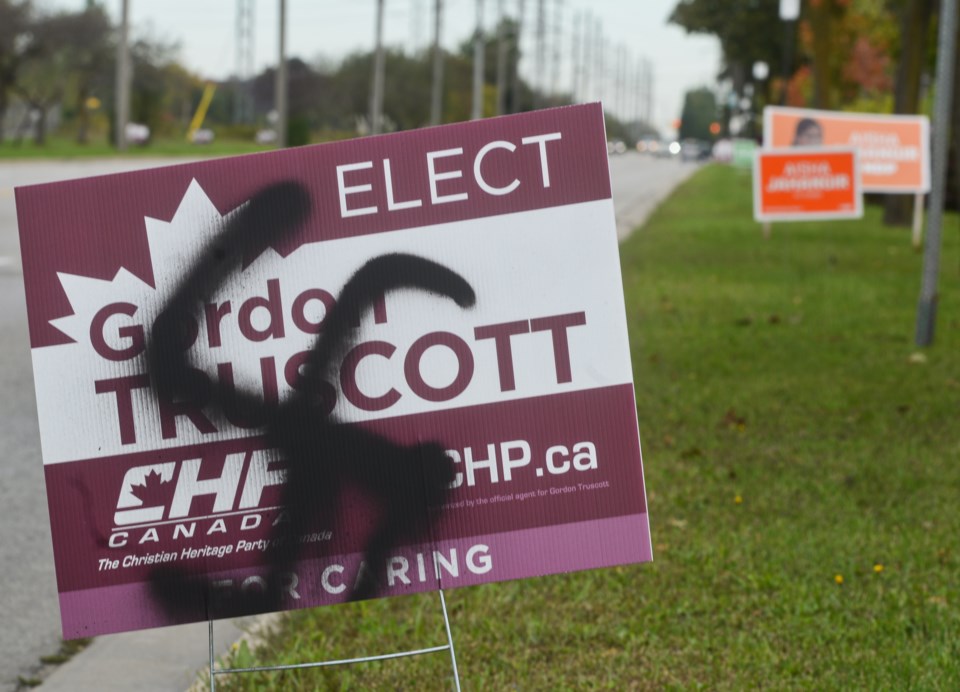Hate has a home in Guelph.
The city regularly ranks among Ontario communities with the highest reported hate crime rate, and while the figures aren’t all in yet, the trend appears to have continued last year.
“Based on the numbers so far, reported hate crimes will be higher in 2020 than in 2019,” said Det. Const. Joel Apps of Guelph Police Service in an email response to questions from GuelphToday.
“It is difficult to determine the cause/effect relationship for why hate crimes seem higher this year than in previous years. There could be several reasons which may interact with one another to influence the numbers.”
Between 2016 and 2019, Statistics Canada shows Guelph was in the top four Ontario census metropolitan areas for hate crimes per 100,000 residents. With 8.4 in 2019, the city came in fourth, behind Hamilton (15.7), Ottawa (10.8) and Peterborough (8.5).
Guelph was third in 2018, 2017 and 2016, with 8.6, 11.6 and 7.6 respectively.
There were no hate crimes reported in Guelph during 2015.
As for 2020, “the final numbers are not in yet,” said Apps. “We have the University of Guelph report to us as well and often there can be a lag time in getting reports to us. The numbers will be finalized in the coming months.”
Hateful sentiment is growing across the country, especially between the Greater Toronto Area and London, Ontario, said Barbara Perry, a professor with the University of Ontario Institute of Technology’s social science and humanities department. She considers the area, which includes Guelph, to be a “hotspot” for hate.
“We’re seeing close to a tripling of active groups,” Perry said, noting there were about 100 active groups identified during a 2015 study. “No we’re seeing close to 300 groups across the country.”
Some are completely new groups, while others are new chapters.
“We’re also seeing more unaffiliated individuals,” Perry said, “people who wouldn’t acknowledge or admit or claim affiliation with any particular group but are engaging with several different groups.”
That increase, she explained, has become evident during an ongoing update to the 2015 study, which involves talking to community-based organizations, law enforcement and intelligence communities.
“Not much has changed except for a broadening of the movement,” said Perry, noting hate revolves around more than race, sexual preferences and culture, it’s about conspiracy theories and anti-state sentiment too.
Perry believes the pandemic has played a significant role in the growth of hate.
“That’s really where a great deal of the contemporary focus of conspiracy theorists is – around the virus itself, vaccines, lockdowns, those sorts of pieces,” she said.
“They’re looking for someone to blame, a scapegoat,” Perry continued, noting many conspiracy theories place blame on easily identifiable groups looking to increase their wealth or take over the world. “Those sorts of conspiracies provide easy, ready answers as to why we’re suffering the way that we are.”
An increase in screen time is part of it too, Perry and Apps agree.
“The internet has made it so accessible for anyone to find social media platforms to voice their ideological views and reach more people than ever before. For anyone who has access to the internet, the ability to consume those viewpoints is so easy and (they can) communicate with like-minded individuals,” said Apps.
“This could be building levels of intolerance amongst people which can lead to incidents of hate crimes – property damage/assaults motivated by someone’s ideological views.”
A rise in “dog and pony politics,” as Perry puts it, south of the border may also be contributing to the increase.
“Political activity in the US under the previous administration seems to have led to polarizations of political/racial/religious views,” agrees Apps. “The conflicts along those ideological lines has seemed more prominent in recent years than I can ever recall. There is the potential that some of those issues/sentiments have made their way to Canada, or if they already existed here, have brought it more into the public eye.”
The “primary obsession” of hate groups vary throughout the country, Perry added, noting this part of the province has seen a “strong uptick” in anti-LGBTQ and anti-trans sentiment.
“It doesn’t fit in with the other conspiracies,” she said. “It’s maybe part of a general malaise because if you look at who’s being drawn to the movement, it’s white men – not just young white men but middle-aged white men as well. There is a sense of loss of privilege, of loss of place in the culture.
“It’s about whiteness, but it’s also about masculinity – very toxic masculinity.”
Until about 18 months ago, she said the focus was on immigrants, particularly Muslims.
Asked about how best to reverse the trend, Perry and Apps have similar ideas and agree education is key.
“I argue that we need to begin with critical digital literacy since so much of what we ‘know’ or ‘learn’ comes from online venues, especially now when our social and professional interaction is limited,” said Perry. “We need to encourage people to be more reflexive about what comes across their screens. … Schools need to provide youth with the tools to recognize and resist when someone is peddling these narratives.”
“Awareness and education for both police and the public is needed to help foster sentiments of tolerance and appreciation of the various groups and cultures that people belong to,” added Apps, calling for more “legislative tools” to address hate crimes. “The Canadian government has just taken such a step by classifying several ideologically motivated extremist groups (Atomwaffen, Proud Boys etc.) as terrorist organizations.”
